William Jackson Harper on “Good Place” comparisons, Amy Ryan on stepping into “Doubt” last minute, and more Tony nominee insights
Harper and Amy join fellow Tony nominees Shoshana Bean, Sky Lakota-Lynch, Sarah Pidgeon, Brian d'Arcy James, and Shaina Taub for a roundtable discussion with EW's "The Awardist."
The 2023-2024 Broadway season brought an embarrassment of riches to the Great White Way — a litany of new shows, splashy revivals, and breakout stars (and one very, very crowded April opening calendar).
But none of it would have been possible without the diligent work and artistry of the collaborators who brought the work to the stage, many of whom have been singled out with Tony Award nominations.
Related: 2024 Tony Award nominations: See the full list, from Merrily We Roll Along to Suffs
EW gathered seven of this year's nominees — William Jackson Harper (Actor in a Leading Role in a Play, Uncle Vanya), Shaina Taub (Best Book of a Musical and Best Original Score, Suffs), Shoshana Bean (Actress in a Featured Role in a Musical, Hell's Kitchen), Sky Lakota-Lynch (Actor in a Featured Role in a Musical, The Outsiders), Brian d'Arcy James (Actor in a Leading Role in a Musical, Days of Wine and Roses), Amy Ryan (Actress in a Leading Role in a Play, Doubt), and Sarah Pidgeon (Actress in a Featured Role in a Play, Stereophonic) — for a wide-ranging conversation about the biggest challenges of their shows, the audience reactions that have surprised them the most, and more.
You can listen to the full conversation on EW's The Awardist podcast, below, but read on for highlights from the discussion.
Check out more from EW's The Awardist, featuring exclusive interviews, analysis, and our podcast diving into all the highlights from the year's best in TV.
ENTERTAINMENT WEEKLY: Some of you are nominated for new work and others for revivals. Would you say that there are unique challenges to both? And if so, what are they?
AMY RYAN: It's thrilling that John Patrick Shanley's play, [Doubt,] has stood the test of time. I feel like I'm just representing the play. I wouldn't be here if John Patrick Shanley didn't write this kick-ass role and this kick-ass play. Without good writing, I don't know what we actors would do.
Related: Steve Carell and William Jackson Harper wallow in misery in Uncle Vanya
William, your play is both a revival and a new translation/adaptation.
WILLIAM JACKSON HARPER: It's funny, in that way we probably treat it like a new play. I do feel like this translation does make it feel uniquely American in a way that maybe other translations of Chekhov don't. They feel British, a lot of them. There's ways in which this play becomes about middle age and about the road not taken. And when you're in that place where you do what you do, because you've always done it, not necessarily because it's what you like or what you love, and how that reality can come crashing in at a really inopportune moment. It is a revival but it is meant to dialogue with our current time.
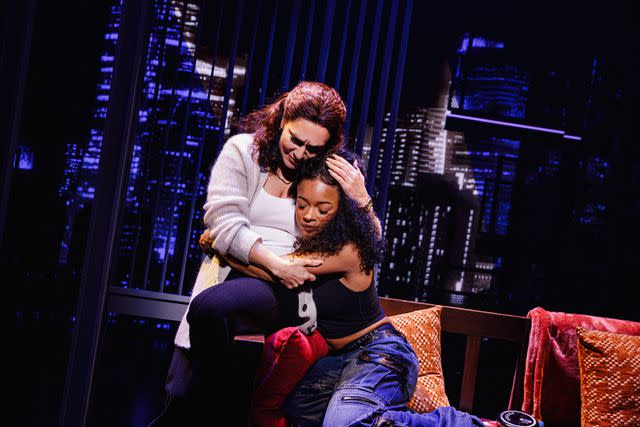
Marc J Franklin
Shoshana Bean and Maleah Joi Moon in 'Hell's Kitchen'Shoshana, Sky, and Brian, you all have very interesting situations in that you're doing totally new work on stage, but you all have source material, be it a book, a film, or Alicia Keys' music. How has that shaped your approaches?
SKY LAKOTA-LYNCH: It is The Outsiders, but it's a true adaptation. We bend what The Outsiders can be and include the history of Tulsa. Of course you have the responsibility of telling the story of The Outsiders, but what do we actually want to say in 2024 and how can we include what's going on in the world?
BRIAN D'ARCY JAMES: There's an inevitable sense of responsibility of not necessarily upholding, but being cognizant of the fact that there's something that precedes you. But it's impossible not to create something new by virtue of the fact that in our case, it's a musical. In a sense, it frees you to not having to be so precious with the fact that something existed before you have your own rule book that you're writing. That gave me a lot of freedom to not be haunted by the ghost of Jack Lemmon in that performance.
SHOSHANA BEAN: The one challenge with Alicia's music pre-existing is that she's the master deliverer of her own work. I love to cover other people's music, but I won't touch it if I feel like I can't re-invent it in some way. I was like, "I can't interpret this better than this woman." It's not a concert; we are still moving the plot forward as best we can with pop lyrics that are theatrical and paint beautiful pictures. But it has been a larger challenge to remind myself of that, that it is not a concert and that we are still telling a story.
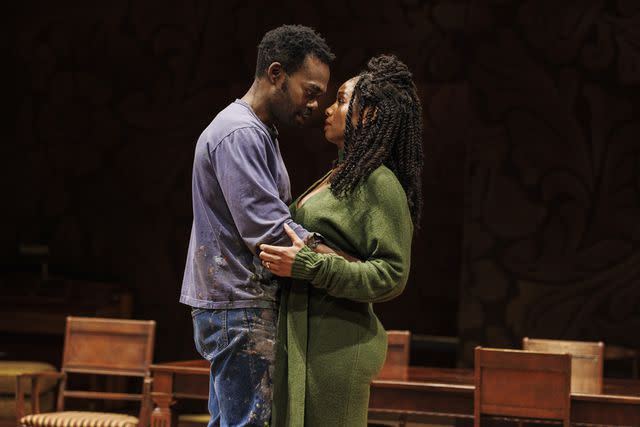
Marc J. Franklin
William Jackson Harper and Anika Noni Rose in 'Uncle Vanya'William, we have famously seen you play a professor plagued by anxiety and existential crises. Is there any of The Good Place's Chidi in Astrov? Do you see a parallel there?
HARPER: I usually never compare characters I've done, just so I don't go to the same tricks. Consciously. I might do it unconsciously, but I consciously don't want to keep doing the same thing. I try to start completely fresh. There's a front-footed willingness to explain his point of view in the world, which might be a parallel with Chidi. But other than that, Astrov makes a big f---ing mess. They pretty much part company right there. They're willing to long-talk about what they think about, and beyond that, they could not be more different.
Shaina, you also wrote and composed your show. How does that change your relationship to your performance?
SHAINA TAUB: It's the best way to learn If something's working. I have to drive the car I've made, and if it crashes, I feel it immediately. If something's not landing, I get that visceral feedback, which is humbling and also helpful. But now, I'm really coming to terms with the fact that I'm done writing it, which I can't really process. The whole show is about the incompletion of any work, which is how I feel. But now it feels like a joy. I feel free. I feel this sense of relief now that I can almost treat it like someone else's.
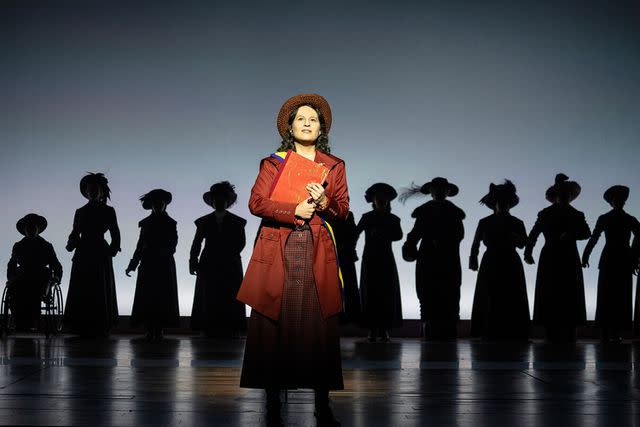
Joan Marcus
Shaina Taub iin 'Suffs'Sky, Johnny is this character who looms large in pop culture, be it from the novel or the film. How did that weigh on you, if at all?
LYNCH: Johnny only has 10 lines and one solo in the whole show, but he's on stage the entire time. And so, I have to empty myself and just listen, which is the most important part in the role. It's taught me a lot about life. I am just not waiting to speak, but listening purely. Of course I stole things from Ralph Macchio — I'm not going to lie to you — but the thing is, I learned how to let that go and just be at peace on stage.
Related: Doubt: A Parable review: Amy Ryan and Liev Schreiber are electric on Broadway
Amy, you have the most unique casting story of anyone here in that you came in at the very last minute after Tyne Daly's illness. How did that come about and why did you say yes?
RYAN: I got a phone call late Sunday night asking if I would step in. They hadn't started previews yet, and from that phone call to me being in costume on stage in front of an audience was seven days later. I never played the role before. I sit at a desk a lot. So I had the scripts the first few nights on the desk. Why did I say yes? Because I knew it was a great part. I knew it was a great play. After saying yes, the harder question was, now that I said yes, how do I do this? There was only time to trust instincts and that's it. If they were wrong, they were going to be wrong, but it was like, make a choice and stick with it. I was white-knuckling it, and it was truly terrifying. I started crying during the first show, to myself, standing in the dark saying, "What have I done?" But there was so much goodwill in the audience at those first few previews. And I thought, "Stop thinking too much and just do it." That's all I had time to do.
Shoshana, Hell's Kitchen is both Alicia Keys' story and it isn't. How did that inform your interpretation of Jersey? How much were you able to actually speak with Alicia's mother and bring that into your work?
BEAN: I requested fairly late in the rehearsal process at The Public, I was like, "Do I get to meet Terry? I just feel like it's my missing piece. I need to meet this woman." We met at Alicia's studio one day, and she brought a bunch of photo albums and I asked her a bunch of questions. I learned very quickly why I was chosen for this role because we innately are very similar humans. If you see us together, we are weirdly similar. We sit the same way, we react the same way. Alicia was searching for the person to play this role for a while, and I feel like the thing that made her comfortable with me was that we have a very similar energy. Once I realized that, I took the pressure off of myself to try to be her or be accurate. I talk to her every day; she's become a dear friend. She gives me enough information and insight into her life and experiences that I'm like, "Oh, that's why, huh?" And I'm able to filter it in and feel the truth of what's happening on stage, but there's no becoming. We just are.
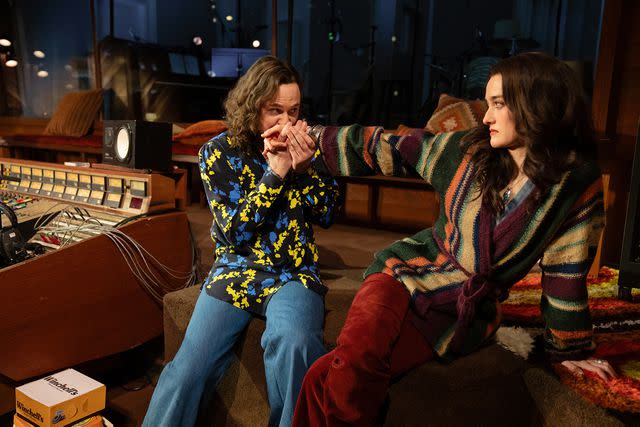
Julieta Cervantes
Tom Pecinka and Sarah Pidgeon in 'Stereophonic'Sarah, how did you approach what I'm sure are the inevitable Fleetwood Mac parallels here? Is there any Stevie Nicks in Diana?
SARAH PIDGEON: It was never interesting to me to make a Frankenstein of these different iconic female singers from the 1970s. Diana and her band are iconic in their own way. If they were real, I think they would stand the test of time, similarly to these other bands that we know so well. I definitely listened to some 1970s music. I'm not a huge audiophile, but there's some people in my life that are, so when they would name a song or a band I didn't know, I'd listen to it. What I tried to tell myself is that Diana might know who these people are in 1976, but if anything, they're her competition or she doesn't like their music. Or she's inspired by their music and she's carving something for herself. Her whole arc is about finding agency in her artistry and her songwriting. It was my job to make Diana who she is, and I hope that she feels she can withstand the test of time in this world the same as all these other greats that do exist.
Sky, this production of The Outsiders is the first time that any adaptation of it has really acknowledged Johnny's race, which feels implicit on the page. Was that something you found inherent in the text?
LYNCH: From the jump, I've always felt like Johnny's a mixed kid, especially the description that is in the book written by S.E. Hinton. Actually going to Tulsa recently with my cast and with S.E. Hinton and getting to see her high school and the kids that were in it, the majority of those kids are mixed kids or Mexican or Black. So I was like, "Wow, I think that we are on to something. We're on to the truth of Tulsa because Tulsa is such a melting pot." When we started to create it, [director] Danya [Taymor] and I were just like, "How can we do this and not be too explicit?" We put it in the costume, we put it in my backstory and things like that, so that when I do leave the show, someone else who's also an outsider can step in. But I do believe that Johnny could be a mixed Native American kid, which is so beautiful.
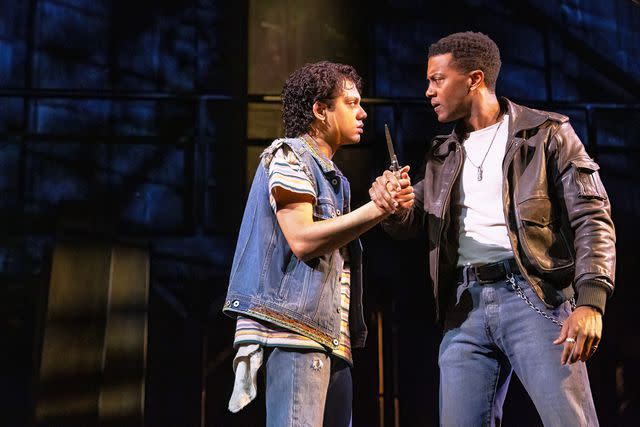
Matthew Murphy
Sky Lakota-Lynch and Joshua Boone in 'The Outsiders'Related: The Outsiders review: S.E. Hinton's beloved novel transforms into glittering Broadway musical
Brian, your character goes on this extremely draining journey through the course of the show from starting as this casual social drinker and then descending into alcoholism and then managing to find sobriety. How were you able to run that gauntlet every night?
JAMES: It was extremely exhausting, challenging, and emotional. But there's nothing more that you'd want as an actor than to be asked to see what the perimeters are of what you're capable of expressing. In this case, it was a very harrowing, heartbreaking, beautiful story of courage and grace, as much as it was about failure and battle. Long story short is that it was mostly exhilarating as opposed to exhausting to plumb those depths.
Amy, doubt is at the center of your play. Because you didn't have that table work and that investigative rehearsal process, did you come to your own separate conclusion as Amy whether Father Flynn is guilty?
RYAN: Brían F. O'Byrne is an old friend, who originated the role of Father Flynn. He coincidentally happened to text me that morning that I was going out to rehearsal. I was like, "Your timing is really weird. But what do you got? Quick, give me the Cliff's Notes here." And he said, "No matter what he says," meaning the actor or the character playing Father Flynn, "he's lying. Never let go of that. Whether you're at a Q&A with an audience afterward, and he says, 'My guy's innocent.' If he happens to say that, just know he's lying. You have to hold that as Amy and Sister Aloysius. And it was the key, because sometimes I would fall into hearing discussions and start to lean [into] it. But if I did, I would ruin the throughline of her certainty. So, even with the show closed, he's guilty. I'm still holding on to that.
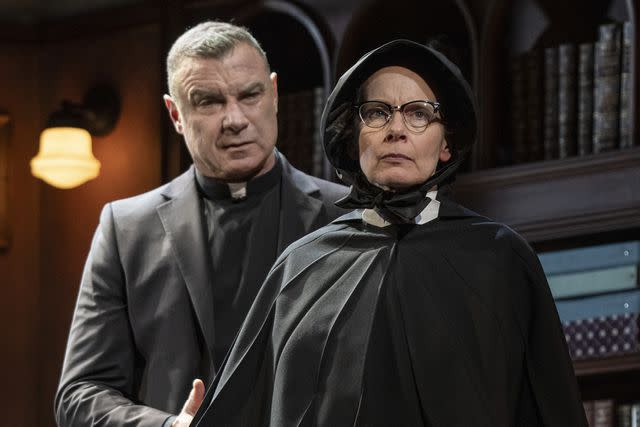
Joan Marcus
Liev Schreiber and Amy Ryan in 'Doubt: A Parable'Shaina, there is so much women's history that has not been told. What is it about Alice Paul and this story that made you so dedicated to this world?
TAUB: There was a Susan B. Anthony quote: "There was never a young woman yet who thought if only she had the management of the work from the start, the cause would've been carried long ago. I felt just so when I was young." That unlocked the entire thing for me. It's the feeling of being young, and whether it's in activism, the arts, whatever it is you do in your life where you're like, "I'm going to shake s--- up. This older generation doesn't get it. Here come me and my friends, let's go.
And then the moment in your life where you get older and you see that younger version of yourself and the next generation coming up and you're like, "Oh my god, am I the old one now?" I wanted to dramatize that — between generations, the pain and the complexity of that feeling of what it means to willingly or unwillingly pass a torch to the next generation. And the better job you do, the more what comes behind you will outgrow you and outlive you.
Related: Alicia Keys and Hell's Kitchen book writer Kristoffer Diaz introduce new song 'Kaleidoscope'
Theater is a living, breathing thing. What audience response has surprised you the most?
JAMES: In Days of Wine and Roses, there's a moment where Joe goes to a motel where his wife is completely wrecked and on a binge. He has since declared his sobriety and is trying very hard to extricate her from that room, all the while not drinking. At the end of the scene, he does. It is just a great dramatic moment. But more often than not in that moment, when Joe takes a drink, people would say, "No, no, no." It was just guttural and very moving to hear that because it told you they're with the play. There's such a deep resonance in that moment for so many different people, for so many different reasons. I've never experienced a moment like that on stage. And it would happen quite a bit. And it was always really moving when it did,
PIDGEON: At one point when Tom Pecinka pushes Eli in the fight, and then apologizes in the next scene later, he says, "Sorry, man, I was an a--hole to you." And someone from the audience shouted, "He didn't want to be pushed." There's also a lot of times in the scene where Tom and I are having this big fight as Diana and Peter about being forced creatively. He says, "What are you thinking?" And there's a long pause, and someone said, "That she's going to break up with you." It feels like this soap opera, these moments from Maury, where they're watching the scene go back and forth and they can't help it. They're so invested that I don't think they even realize it's coming from their mouth. But I always find it exciting. It's like there's an eighth ensemble member, and it changes every night.
TAUB: There's a moment in the second act when Woodrow Wilson finally capitulates and endorses the suffrage amendment in front of Congress. He comes out for the suffrage amendment finally, but he says, "But let it be known that the voices of foolish agitators in the streets did not reach me at all." When I first found it in the deep recesses of this long ass speech he gave to Congress, I was like, "Wow, what an incredible moment of both erasure of those agitators, but also of acknowledgement." When we get to it every night, there's a huge laugh. It gives me such pleasure because it's this dry quote from history, but they're listening. They understand, they see us, and they're laughing at the irony of it. We just watch them get it, and that's been satisfying.
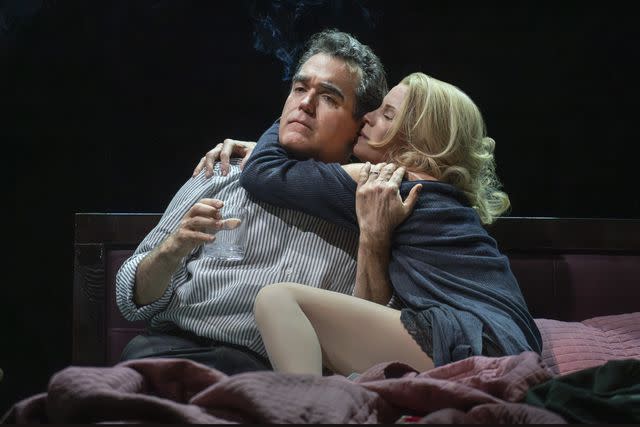
Joan Marcus (2024)
Brian d'Arcy James and Kelli O'Hara in 'Days of Wine & Roses'BEAN: We are drawing a really incredible crowd of people that are not necessarily traditional theatergoers. They're not people who are coming to the theater consistently, if ever. Because of that, there is a wild freedom in response in our theater. It also begs for it too — the way the sound is designed, the way the music is, the way it's arranged. It is a concert of sorts. Someone brought a maraca the other day and instead of applauding, they were shaking in it time along with the music.
HARPER: There's this moment in the first scene of the play where Waffles is talking about how his wife left him the day after they got married, but he still loves her and he helps her out and left her the house and all that stuff. It's really interesting when the normal house is watching the show, they tend to laugh at that moment. But when we have a student audience, they're so upset on his behalf. It is the best reaction because we're all a little cynical and ready for the laugh. And then these students are just so upset. They're like, "Dude, no."
LYNCH: Our audiences are mostly students, so we get a lot of rowdy reactions. There's a scene where Pony Boy is being drowned to near death by a bunch of these jock guys. Johnny is getting beat up and trying to find his knife to stop it from happening. Finally Johnny, after two minutes of this fight happening, gets the knife and stabs the guy. The audience erupts every single time. They're like, "Oh my god, oh my god." And then it goes into slow-mo and they're still clapping, which is just so wild.
JAMES: These make me think of one last year when I was doing Into the Woods at a student matinee. It's the moment when the Baker learns that his wife has just been squished by a giant. It's a really dramatic moment for the Baker. His line is, "My wife...has just been killed." And I was really into it, really emoting. These kids were kind of with the show, kind of not with it, but there was one particular section that was pretty vocal. I get to my line, I say, "My wife," and in the pause, I hear, "My Wiiiife," someone doing their best Borat. And I was so mad, so mad for a second, and then I was like, that's hilarious.
Read the original article on Entertainment Weekly.
